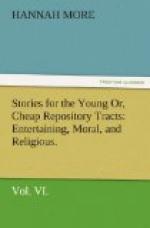The Jews are there represented as murmuring against the good man of the house, on account of his rewarding the more late and early laborers, the ancient Jews and the newly converted Gentiles, by giving each of them a penny, “saying, These last have wrought but one hour, and thou hast made them equal unto us, who have borne the burden and heat of the day. But he answered one of them, and said, Friend, I do thee no wrong: didst not thou agree with me for a penny? Take that thine is, and go thy way: I will give unto this last even as unto thee. Is it not lawful for me to do what I will with mine own?” It was no injury to the Jews that the poor Gentiles were admitted, though at a later hour, into the church, and the Jews had therefore no right to complain; on the contrary, they ought to have rejoiced at it. In like manner, it can be no injury to those among us who may have served Christ from our youth, that any poor outcast should be admitted to the same Christian privileges with ourselves; and we also ought to rejoice, as the angels of God are said to do, over one sinner that repenteth. Again it may be remarked, that even the first calling of the Jews arose not from any superior merit in them, but from the sovereign goodness of God. Surely, therefore, it was most unreasonable in those people to complain of God’s extending the same mercy to the Gentiles. Much in the same manner, it may be remarked in respect to the present day, that the salvation even of the best of men arises not from any merit of their own, but merely from God’s free mercy in Christ; and surely, therefore, one pardoned sinner among us ought not to complain of the extension of the same pardon to another.
But the parable, in the two last verses of it, proceeds a step further, for it is there added by our Saviour, “Is thine eye evil because I am good?” which is as if he said, “What, do you take offence then at my being so merciful? Does it provoke your envy to see a vile Gentile called at the eleventh hour, and made equal to yourselves, who profess to have been the people of God from the beginning, and to have borne the whole burden and heat of the day?” Some very awful words are then added, wherein it is implied, that they who are ready to make this objection, brought thereby their own religious character into suspicion; and that these very penitents of the eleventh hour, whom they now presumed to despise, should hereafter even take place above them—for it is said, “So the first shall be last, and the last first; for many are called, but few chosen.”
These words appear to be a prophecy of our Judge, which relates to the great day of judgment. Then many a popular but irreligious character, many a one who has been praised to the stars in this ignorant and misjudging world, and whose supposed virtues have both deceived himself, and dazzled all around him, shall sink at once into everlasting shame and disgrace; while many a poor, despised, yet repenting sinner, shall come forward and receive his crown of glory.




